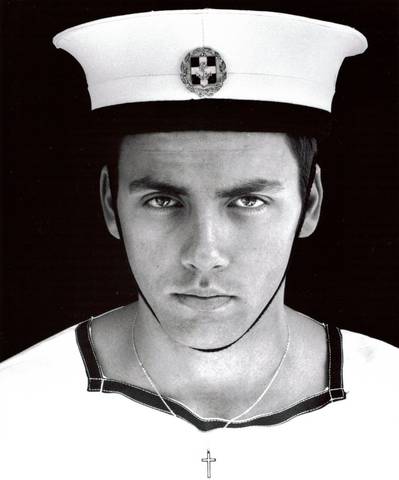 [ from Stahis Orphanos’s MY CAVAFY which pairs Cavafy’s poems with contemporary portraits ]
[ from Stahis Orphanos’s MY CAVAFY which pairs Cavafy’s poems with contemporary portraits ]
I just came across this article about comparing translations of Constantin Cavafy’s “The City”, and thought I would throw a few more ideas and translations of the last stanza into the mix.
First, a translation from our own Edmund Keeley and Philip Sherrard (C.P. Cavafy, Collected Poems. Translated by Edmund Keeley and Philip Sherrard. Edited by George Savidis. Princeton University Press, 1992).
You won’t find a new country, won’t find another shore.
This city will always pursue you. You will walk
the same streets, grow old in the same neighborhoods,
will turn gray in these same houses.
You will always end up in this city. Don’t hope for things elsewhere:
there is no ship for you, there is no road.
As you’ve wasted your life here, in this small corner,
you’ve destroyed it everywhere else in the world.
The directness, here, electrifies the voice of Cavafy. The tone feels cavernous and cold, which lets the idea of an inescapable reputation ring and echo throughout. They chose to include contractions. The poem seems to beg to be spoken, something which I tend to like, and the intimacy helps the drive till the end.
Next, Rae Delven’s 1948 translation lauded by, among others, W.H. Auden:
You will find no new lands, you will find no other seas.
The city will follow you. You will roam the same
streets. And you will age in the same neighborhoods;
and you will grow gray in these same houses.
Always you will arrive in this city. Do not hope for any other–
There is no ship for you, there is no road.
As you have destroyed your life here
in this little corner, you have ruined it in the entire world.
I love the inversion of “Always you will arrive in this city.” The emphasis of “always,” rather than feeling archaic, seems to hammer home the point. Interesting how the next line — “There is no ship for you, there is no road” is exactly the same as Keeley/Sherrard’s. “Destroyed” certainly adds a much different texture than “wasted.”
And, finally, Daniel Mendelsohn’s recent 2009 translation:
You’ll find no new places, you won’t find other shores.
The city will follow you. The streets in which you pace
will be the same, you’ll haunt the same familiar places,
and inside those same houses you’ll grow old.
You’ll always end up in this city. Don’t bother to hope
for a ship, a route, to take you somewhere else; they don’t exist.
Just as you’ve destroyed your life, here in this
small corner, so you’ve wasted it through all the world.
The most colloquial of the three, Mendelsohn’s translation hits the point in a different way, like the hurtful rant of a drunken uncle you admire. For some reason — maybe it’s the relentless commas instead of periods — this translation feels more disparaging. The speaker not only advises against hope, but says “Don’t bother to hope…” Things seem already to have been decided. A life is already “wasted…through all the world.”

It’s Rae Delvan’s that strikes me, again and again, particularly at the center, where I will grow gray in these same houses, there it leaps vividly into something beyond itself. And I find in its archaisms strength.
Many readers of a certain generation will have first found Cavafy via Lawrence Durrell, so it seems worthwhile to share Durrell’s “transplantation” of his Alexandrian precursor.
I am recalling a splendid evening spent off Finchley Road in London with a group of neighbors who gathered to read Cavafy poems in the round — same poem, passed around and read through different translations. Great memory. (Where are those readers now?)
* * * * *
From Justine (1957)
I have tried to transplant rather than translate — with what success I cannot say.
THE CITY
You tell yourself: I’ll be gone
To some other land, some other sea,
To a city lovelier far than this
Could ever have been or hoped to be —
Where every step now tightens the noose:
A heart in a body buried and out of use:
How long, how long must I be here
Confined among these dreary purlieus
Of the common mind? Wherever now I look
Black ruins of my life rise into view.
So many years have I been here
Spending and squandering, and nothing gained.
There’s no new land, my friend, no
New sea; for the city will follow you,
In the same streets you’ll wander endlessly,
The same mental suburbs slip from youth to age,
In the same house go white at last —
The city is a cage.
No other places, always this
Your earthly landfall, and no ship exists
To take you from yourself. Ah! don’t you see
Just as you’ve ruined your life in this
One plot of ground you’ve ruined its worth
Everywhere now — over the whole earth?
It’s tempting to take what’s best from each and combine them. Overall, I think I like the Keeley best, but nothing in either of the other two can beat the wonderful repetition of ‘and you will…’ in the Delven version. I prefer ‘wasted’ to ‘destroyed’, which strikes me as over-dramatic and better used in the final line, where a bit of hyperbole does the job wonderfully, but I wonder which of the two is closer to the original. Mendelsohn reverses the order, which seems all wrong to me. I also like the ‘elsewhere’… ‘everywhere else’ echo in the Keeley…